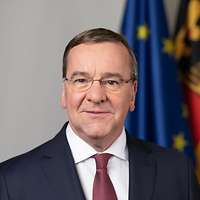
News
“Germany stands with you”: Pistorius in the Lithuanian parliament
First paragraph of the articleThe brigade in Lithuania: Pistorius speaks in the Seimas
A German brigade – about 5,000 Bundeswehr members – permanently stationed in Lithuania: the brigade in Lithuania is the Bundeswehr’s beacon project for the watershed era in security policy known as the Zeitenwende. Federal Minister of Defence Boris Pistorius visited the Seimas, the Lithuanian parliament, on 26 September to reaffirm cohesion on the eastern flank.
“I grew up as a child of the Cold War”. German Federal Minister of Defence Boris Pistorius addressed these words to the Lithuanian parliament in Vilnius on 26 September 2024. He added that he vividly remembered the tensions of those volatile times: “For more than forty years, Germany itself was at the frontline of that divide. Split between two worlds, between democracy and dictatorship, between freedom and oppression”. Just like many other Germans, he knows how it feels to be the eastern flank. For Germany, Pistorius recalled, NATONorth Atlantic Treaty Organization was not an abstract concept back then: “It was the shield that safeguarded our freedom”. He said that he remembered with deep gratitude how Germans were able to rely on their allies and how these allies came to be friends – friends who were ready to commit to defending Germany’s territorial integrity and their shared freedom. “Today, our Baltic and eastern allies can expect the same from us”, Pistorius assured the parliament.
The Minister noted that the brigade in Lithuania is not simply a matter of deterrence and Germany’s commitment to the security of its allies. It is also about partnership and strengthening cooperation between the countries. “With this decision, we reinforce the strength of our Alliance and we deliver on our promise to protect a free and democratic Europe. Our soldiers will stand shoulder to shoulder with Lithuanian forces, ready to defend this country”. This stationing therefore also reflects Germany’s recognition of the changing European security architecture. Pistorius thanked the Lithuanian parliament for its unwavering support for the implementation and establishment of the brigade in Lithuania.
The Seimas – home of Lithuanian democracy
Pistorius emphasised that the Seimas was a symbol of Lithuania’s contribution to the reunification of a free and democratic Europe – after decades of the Cold War and of insurmountable borders that cleaved the European continent in two. “35 years ago, you, the people of Lithuania, bravely stood up for freedom and independence. You peacefully and courageously opposed and eventually defeated totalitarian oppression”. When Lithuania declared its independence in 1990 and when Soviet tanks tried to crush this independence in 1991, Pistorius continued, the world witnessed something extraordinary: “a resolute nation defying one of the most powerful regimes in history”.
“He must not succeed”
For years, Russia has been rapidly ramping up its armaments production and massively expanding its armed forces. According to Pistorius, all of this leaves no doubt that Ukraine is only the beginning for Russia. “Putin’s real enemy is our free and independent, democratic way of life. Values for which the Lithuanian people fought for decades”, the Minister said.

Your security is our security.Minister of Defence Boris Pistorius
These fundamental principles and values, the Minister continued, are under fire today. By invading Ukraine, Russia has started a war against freedom, stability and peace. This, Pistorius said, is another reason to ensure that Putin does not get what he wants: “He must not succeed”. As the Minister explained, that is why Germany is one of the strongest supporters in helping Ukraine to restore its territorial integrity. Pistorius expressed his confidence that “it is in our power to support Ukraine in fighting and winning this war”.
Now and in the future: Germany stands by Lithuania
Referring to the stationing agreement, Pistorius stressed to the Lithuanian Parliament that: “We see great potential to expand our bilateral cooperation, be it on defence projects, as part of cyber initiatives, in the field of energy security, in trade and investments and also in the field of culture and language. This is why we welcome the strategic guidelines adopted by the Lithuanian government, which aim to strengthen our bilateral relations even further”.
A world full of threats and challenges, said Pistorius, requires a stronger and more united Europe. Aggressors can only be deterred by leaving no doubt about the fact that: “We are willing and able to defend every centimetre of our territory”. The current security environment, he added, “calls for bold investments, political will and a strong commitment to collective security”. Above all, he said, “it calls for bold and swift action”. In Pistorius’ words, “Ukraine has been a wake-up call, maybe the last one we will get”.
Joint commitment to NATONorth Atlantic Treaty Organization
The stationing of the German brigade is already in full swing. The first troops have arrived in Lithuania, and the infrastructure is being developed. The brigade is expected to achieve operational readiness in 2027. Defense Minister Boris Pistorius and his Lithuanian counterpart signed a corresponding deployment agreement in Berlin in mid-September.
“Members of Parliament: We still have a long way to go, but we are by no means at the beginning”, Pistorius underscored at the end of his speech. “We Europeans know that peace and security must never be taken for granted. They need to be defended, by our generation and those to come”. He expressed his conviction that, together, we can safeguard Europe as a place of peace, security and hope for future generations – a Europe that is united and speaks with one voice. “This is what we and the German brigade stand for.”
Share content on